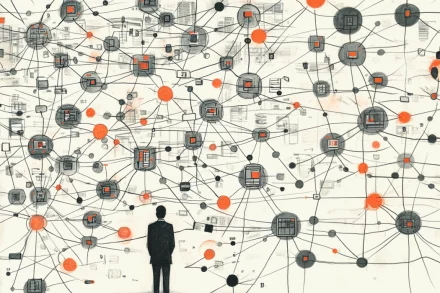The Armenian Lawyers Association and Iravaban.net‘s innovative series “LegalTech Armenia” aims to uncover the path of convergence between law and technology. Within this series, we present how the digital revolution is reshaping the legal landscape in Armenia and worldwide. The project’s conceptual author and leader is Karen Zadoyan, President of the Armenian Lawyers Association.
In the seventh article of the innovative series, “The Big Data Revolution in Law: The Future is Already Here,” we will reveal how big data is transforming law on a global scale.
Iravaban.net‘s journalists and experts, equipped with the latest technological tools, including advanced applications of artificial intelligence, will present analyses, exclusive interviews, and engaging stories, prepare photographs and infographics. We will uncover how data science, big data, and machine learning are transforming legal practice, the judicial system, and legislative processes.
- Introduction
Big Data has become a revolutionary force in many fields in recent years, and law is no exception. In this article, we will explore how big data is transforming the legal world and what prospects are opening up for Armenia in this field.
- The Role of Big Data in Modern Law

The image symbolizes the modern work environment of a lawyer.
Big data has revolutionized the legal field by allowing lawyers to analyze huge volumes of information with unprecedented speed and accuracy. This technology enables the discovery of patterns and trends that would be impossible to notice using traditional methods. Lawyers can use big data to predict case outcomes, assess risks, and develop more effective strategies.
Example: The United States judicial system has implemented the “Public Access to Court Electronic Records” (PACER) system, which allows the public electronic access to court documents. This vast database of information enables lawyers, researchers, and the public to analyze trends in court cases, study decisions, and monitor the functioning of the judicial system. PACER is a prime example of the use of big data in the legal field, contributing to transparency and research.
- Application of Big Data in Legal Research

The image symbolizes the law library of the future.
Big data is transforming the course of legal research. Traditional methods that required hours or even days can now be accomplished in minutes. Artificial intelligence and machine learning algorithms can analyze thousands of legal documents, court decisions, and legislative acts, revealing important connections and trends. This allows lawyers to perform deeper and more comprehensive analysis.
Example: Lex Machina uses machine learning algorithms to analyze litigation data. Their tool allows lawyers to understand the behavior of judges, lawyers, and parties, as well as predict the duration and costs of litigation.
- Big Data in the Judicial System

The image symbolizes a technologically advanced courtroom.
The application of big data in the judicial system offers new opportunities to increase the efficiency of justice. This technology can be used to optimize case management, increase the efficiency of judges’ work, and even support judicial decision-making. However, the use of big data in this field also raises ethical questions, especially related to impartiality and privacy protection.
Example: In France, a law passed in 2019 prohibits the use of judges’ personal data to predict their decisions. This shows that the use of big data in the judicial system also raises ethical concerns.
- The Impact of Big Data on Law Firms

The image symbolizes a modern law office.
Big data is changing the way law firms work. It allows for more accurate predictions, improved risk management, and more personalized services to clients. Law firms are implementing data analysis tools to improve their internal processes, optimize resource allocation, and create new business models.
Example: Allen & Overy law firm has created the Fuse technology innovation center, where big data-based tools are developed to improve the delivery of legal services.
- Big Data and Legal Compliance
Big data has become an indispensable tool for ensuring legal compliance. Companies use advanced analytical tools to monitor their activities, detect potential violations, and predict future risks. This approach allows for faster and more efficient response to legislative changes and reduces compliance costs.

The image symbolizes the interconnection between data and compliance.
Example: The Relativity Trace program uses machine learning and big data to monitor organizational communications and identify potential legal risks.
- Armenia’s Prospects in the Field of Big Data Application
Armenia, as a developing technology center, has great potential in the field of big data application. The country can benefit from international experience by implementing advanced solutions in its legal system. This may include the development of e-justice systems, promotion of legal technology startups, and modernization of legal education.
Example: In Armenia, the e-government system has already begun to implement elements of big data in the processes of processing and searching legal documents. This can serve as a basis for further developments.
The Role of the Armenian Lawyers Association
The Armenian Lawyers Association (ALA) is actively working towards the development of legal technologies, including the application of big data in Armenia. ALA organizes seminars and courses to introduce lawyers to new technologies and their application possibilities. In addition, the association cooperates with local and international organizations for the exchange of experience and the introduction of new technologies.
Comment from Karen Zadoyan, President of the Armenian Lawyers Association, to Iravaban.net:
“Big data is changing the face of law around the world, and Armenia should not lag behind this global trend. We at the Armenian Lawyers Association see great potential in the application of big data to modernize and increase the efficiency of our country’s legal system. The Armenian Lawyers Association is making efforts to ensure that lawyers, technology companies, and relevant authorities work together to develop an environment that will promote the best practices of big data application for Armenia.”
- Conclusion
Big data is fundamentally changing the legal field, improving decision-making processes, increasing efficiency, and creating new opportunities. However, its use also requires caution and consideration of ethical issues.
About the Next Article:
Don’t miss the eighth article in the innovative series “LegalTech Armenia” by the Armenian Lawyers Association and Iravaban.net: “Lawyers of the New Era: The Future of Digital Legal Education.” How is legal education changing in light of technological progress?
In our upcoming article, we will reveal how leading universities and law schools are transforming their curricula to prepare future lawyers. We will explore new subjects being integrated into legal education, such as legal technologies, data analysis, and artificial intelligence. We will discuss how virtual reality and gamification are changing teaching methods. We will uncover how Armenia can modernize its legal education system in line with global trends. Get ready to see how the profile of the future lawyer is being shaped and what skills are necessary to succeed in the digital age.
Follow our publications and discover the future of law with us.


















